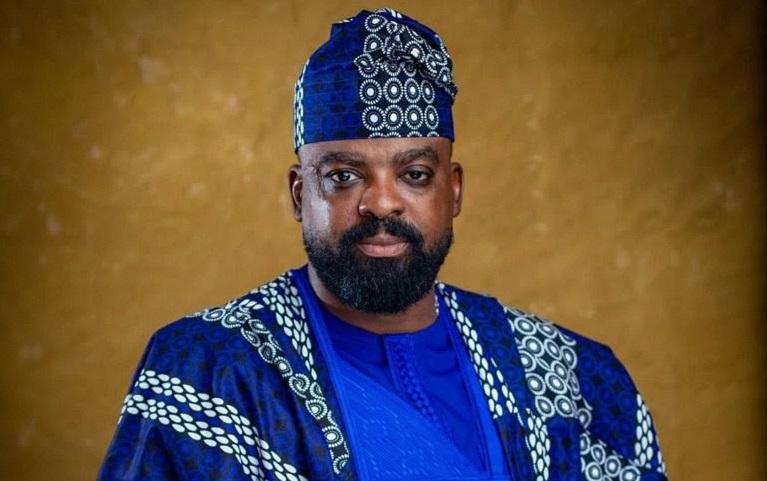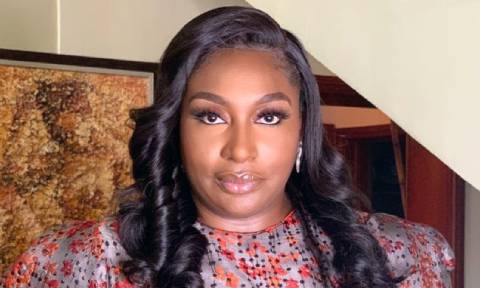
The saying that “We are nothing but pencil in the hand of the creator” may not have gained popularity save
for Wale Adenuga.
The former Ikebe Super publisher and now producer of the favorite Super Story, a television soap is a personality so immersed in entertainment that he is hardly found in parties. The social scene is never his oyster. Despite his deep pocket, Wale Adenuga is such a busy man that he never cares a hoot about his clothes or shoes. He’d rather have a designer brain than to designer shoes.
His tight schedule, notwithstanding, he speaks with Saturday Vanguard on his style of life, the entertainment industry and other sundry issues. Enjoy
How did you get into the entertainment industry?
Back in my University days, I was involved in the production of the campus magazine- it was an entertainment magazine with jokes and cartoons. After my graduation, I decided to start a magazine on my own. I started off with Ikebe Super and later, Super Story came on board.
We were doing very well until the late 80s when the nation suffered economic depression. It affected publishing because we relied heavily on imported materials. And from that moment, we started looking for alternative way of entertaining our people. And that’s why we moved from the print to electronic.
Is there any possibility of going back to publishing and bringing back Ikebe Super?
Yeah, the possibility is there. We’re still considering options but that also depends on the economy. If it stabilises, fine. I have a special interest in publishing, especially magazines. There are people who just love cartoons. I’ll revive it one day.
If you were not into entertainment, what would you have been doing?
It’s like God has prepared me for this. Since I was born, I discovered I could draw and act. I never had any formal training in drawing. I created all the characters in Ikebe Super magazine. Even when I was in secondary school (Kings College), I was part of the formation of the school band. It might interest you to know that I also have talent for music.
Therefore, I don’t think I’d been able to do any other thing. I was created for entertainment. That’s my calling.
Going by your works, one could say you were rascally when you were in school?
No, I’d say I was a bit of a non-conformist. I do what I believe in. I don’t follow the multitude. I’m a highly cerebral person. I put my brain to use all the time. That’s why I don’t believe in style and flamboyancy. People who are really stylish follow the crowd. They follow the trend and things in vogue. That’s not in my dictionary. I opt for a designer brain rather than designer shoes.
Does your wife have influence on the way you turn out?
No, my wife knew me very well long before we got married. We met at the University of Lagos and she knew me to be a non-conformist. What I used to wear was ‘Adire’, I never conformed with campus style and what people were wearing.
What you wear should give you comfort.
I wear slippers and sandals most of the time and I wear boxers and not tight pants so that air will go into all parts of the body. I wear short sleeve shirt atop shorts and a pair of sandals.
It gives me comfort.
How do you turn out at functions?
I don’t go to events and functions. The truth is I don’t even know event places. I don’t go out. My work is enough to keep me busy.
How do you observe your birthday?
I’m not a birthday person. Usually, on that day, I pray and give glory to God. I thank Him for what He has done and what He’s going to do in my life. I’ve never celebrated my birthday. I don’t believe in it. Besides, in a poverty stricken nation like ours, if you have excess money, you help the needy. You will not find me at any birthday party. I have more serious things to do.
And what is your wife’s reaction to this style of life?
She’s very comfortable with it. In any case, I’ll not stop her from expressing her own style and what she believes in.
And we’re very compatible. She is also not a birthday person. She’s very committed to church activities and as a pastor at the Redeemed Church, she’s also very busy. Most of our celebrations are about thanking God. Our parties never exceeded the sitting room thing. You see, Africans, especially, Nigerians engage themselves in unproductive activities.
But the white man appreciates the value of time more than we do. Your achievement in life is a summation of what you do in life on a daily basis.
Abroad, before you become a millionaire, you work. But here, most millionaires cannot account for their wealth. It’s only in Nigeria that you see a poor man today, probably staying in Ajegunle, and then in few weeks later, you see him driving a Hummer Jeep.
That only happens in Nigeria. This is because people cut corners to get rich quickly. Such person celebrates birthdays to high heavens. And because I work for every kobo I make, I find it difficult to throw away money frivolously.
But I give glory to God. If you’re making normal profit on a genuine business, you’ll find it difficult to buy car for a girlfriend.
But how do you unwind?
I watch football matches, movies and other entertaining programmes on television. I also unwind through activities like travelling for holidays. I just came back from Canada where I stayed for two weeks. And I had a nice time.
Are you also amused by your work and how do you get inspiration?
Yes, I create jokes out of everything around me. When I was publishing Ikebe Super, I did a lot of documentary research. I still do that now. I’d go abroad and buy lots of books on comedy. I have lots of books on jokes too. You see, you cannot do a comedy programme if you don’t know jokes. Comedy is just a compilation of jokes in a drama form. Dramatizing the jokes in the script is another skill.
If you were to diversify, what would you do?
I studied Business Administration in the University, remember? You have to be very careful if you want to diversify. And if you must, the best way to do so is by identifying the areas that are not doing well in your business and concentrate on areas that are doing well.
This means you’re simplifying your operations and by extension, diversifying. Right now, the few programmes we have on TV are doing well. So, we don’t have to add anything new for now.
This is not the time to produce more programmes. For now, we’ll try to minimize expenses and weather through the storm. Don’t forget that Wale Adenuga conglomerate made of PEFTI, Binta Schools run by my wife and Wale Adenuga Productions, WAP.
What informed your philosophy as expressed by the dictum – we’re nothing but pencils in the hand of the creator, Was it based on any regrets. Did you falter?
You see, I don’t have any regret. I believe it’s God that directs whatever we do. Whatever any human being does, it is directed from above. The assignment that God gives you is what you’ll do. Only God makes things happen. He is the force behind our power.
My own job is to carry out the assignment. He gave me to His glory and humanity. I believe I’m on an errand and that God has planned my movement. When I came across that statement in one book, many years ago, I just imbibed and embraced it.
Believing it was meant for me. It is just like a hammer in the hand of a carpenter when it is put to use, you don’t praise the hammer but the carpenter who applied the force to produce the desired result. Ordinarily, the hammer can’t do anything.
So, also is the pencil. If you draw the most beautiful girl now, nobody will praise the pencil but the hand, which is the person holding it. So, God is the one teaching me to do all that I do.
How do you get your stories for Super Story?
When God said Wale Adenuga, you’re going to be an entertainer, he provided the stories. I read and I see stories. Every creative person has a third eye with which he sees what others don’t see. If God created you as a musician, just go to the forest, the wind blows, you’ll hear music from the rumbles of the leaves, you’ll hear music from the birds, from crickets.
But to those who are not musicians, all these will be regarded as mere noise. But to a musician, it will be inspiration. So, the same goes for a story writer. He sees stories in everything. When I go to church, I get stories. The luck I have, again, is that I’m able to discern stories from a mere speech or remark of people.
This is the same speech or remark other people will hear and laugh at. And when I get home, I scribble and later develop it into a script.
Sometimes, people also share their real life stories. I have files and files of stories. I also see stories in newspapers. (Pointing out a Super Story material from Vanguard Newspaper on his table). You see, I can make a story out of this.
In fact, I see story everyday, especially in Saturday Vanguard and The Sun newspapers because they carry human angle stories. Even in my dream I see stories because what you think always in your heart, register in your mind and forms part of your dream.
If you have passion for what you’re doing, you’ll get materials for it. Right now, I have stories that can last for 20 years and we already have six months production of both Super Story and Pa Ajasco. We’ve professional writers that write stories for us everyday.
How do you select your characters?
The thing is that if you do it sincerely, you do it well. And that is why people love Super Story. It is one thing to have a good story, it is another thing to have good casting. You can kill your good story with bad casting. This is one of the things that is killing Nollywood.
When they have a good story, they kill it with bad casting– using a 45-50 -year-old-man as undergraduate. If you watch Super Story, we try to match our casts with the story. The essence is to make it credible and real.
Here, when the script is ready, we hold meetings to brainstorm on who fits in what role. The issue of sexual harassment does not exist here. We’ll never do it.
Can you vouch for your production crew on this issue of sexual harassment?
They don’t. My production manager is a lady and she’s the one who does most of the production. And, as far as casting is concerned, it falls within my sweep because I’m the producer. I list out the characters and call my managers. We study the script and brainstorm on who fits in what role? Usually, it used to be a hot debate because only the best are selected. We don’t joke with our casting.
So, what you’re implying is that quality as a result of casting stands you out from other producers?
Yeah, and credibility. The story looks credible and different. Super Stories, for instance, are real life situations. When you watch Super Story, you see yourself in it. We take our time to bring out credible stories.
What’s your view of Nollywood?
I’ll simply say we’ve left undone what we ought to have done. Aside the issue of quality, there are certain things that we need to concentrate on. We need to concentrate on areas that will give value and credibility to the industry. We should endeavour to produce our films on celluloid and take them to cinemas first. Though it’s expensive, but by doing so, you’d be able to recoup some of your money before the movie is released on VCD or DVD.
In countries like India and America, that’s what they do. In 1983, I produced a film on celluloid and took it first to the cinemas (Papa Ajasco films).
I made all my money and later released it on VCD. So, there is no way you can produce a good film and sell it direct as home video and make profit. If you produce a film for the cinema, it can’t be pirated because it is not on DVD and VCD.
The South African industry produces four films in a year and they are rated higher than Nigeria’s home video of about 3,000.
A lot of people have complained of this. What is the way out?
The way out is for us to return to the cinemas. Ben Bruce has shown that the cinema culture is still very viable. I had suggested that as a member of the Vision 2020 on Culture, Tourism and National Re-Orientation, and prayed that government would invest in the project.
So, what I think first and foremost is that investors should build cinema houses just like we have stadia for sports all over the federation. Cinema houses where people can go watch movies for a fee and thereafter, instead of calling investors to put money into film production.
It is expensive but by the time such films are taken round the states, your money is made. It is only after that you can mass produce on VCD and DVD.
Look at what Stephanie Okereke did recently. She made N10 million in one week at the cinemas. It is a pointer to what could happen to our movie industry if we do the right thing.



















